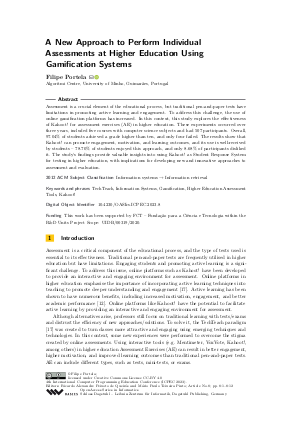A New Approach to Perform Individual Assessments at Higher Education Using Gamification Systems
Author
Filipe Portela 
-
Part of:
Volume:
4th International Computer Programming Education Conference (ICPEC 2023)
Part of: Series: Open Access Series in Informatics (OASIcs)
Part of: Conference: International Computer Programming Education Conference (ICPEC) - License:
 Creative Commons Attribution 4.0 International license
Creative Commons Attribution 4.0 International license
- Publication Date: 2023-08-09
File

PDF
OASIcs.ICPEC.2023.8.pdf
- Filesize: 1.01 MB
- 12 pages
Document Identifiers
Subject Classification
ACM Subject Classification
- Information systems → Information retrieval
Keywords
- TechTeach
- Information Systems
- Gamification
- Higher Education Assessment Tools
- Kahoot!
Metrics
- Access Statistics
-
Total Accesses (updated on a weekly basis)
0PDF Downloads0Metadata Views
Abstract
Assessment is a crucial element of the educational process, but traditional pen-and-paper tests have limitations in promoting active learning and engagement. To address this challenge, the use of online gamification platforms has increased. In this context, this study explores the effectiveness of Kahoot! for assessment exercises (AE) in higher education. These experiments occurred over three years, included five courses with computer science subjects and had 507 participants. Overall, 97.04% of students achieved a grade higher than ten, and only four failed. The results show that Kahoot! can promote engagement, motivation, and learning outcomes, and its use is well-received by students - 78.70% of students enjoyed this approach, and only 8.68% of participants disliked it. The study’s findings provide valuable insights into using Kahoot! as Student Response System for testing in higher education, with implications for developing new and innovative approaches to assessment and evaluation.
Cite As Get BibTex
Filipe Portela. A New Approach to Perform Individual Assessments at Higher Education Using Gamification Systems. In 4th International Computer Programming Education Conference (ICPEC 2023). Open Access Series in Informatics (OASIcs), Volume 112, pp. 8:1-8:12, Schloss Dagstuhl – Leibniz-Zentrum für Informatik (2023)
https://doi.org/10.4230/OASIcs.ICPEC.2023.8
BibTex
@InProceedings{portela:OASIcs.ICPEC.2023.8,
author = {Portela, Filipe},
title = {{A New Approach to Perform Individual Assessments at Higher Education Using Gamification Systems}},
booktitle = {4th International Computer Programming Education Conference (ICPEC 2023)},
pages = {8:1--8:12},
series = {Open Access Series in Informatics (OASIcs)},
ISBN = {978-3-95977-290-7},
ISSN = {2190-6807},
year = {2023},
volume = {112},
editor = {Peixoto de Queir\'{o}s, Ricardo Alexandre and Teixeira Pinto, M\'{a}rio Paulo},
publisher = {Schloss Dagstuhl -- Leibniz-Zentrum f{\"u}r Informatik},
address = {Dagstuhl, Germany},
URL = {https://drops.dagstuhl.de/entities/document/10.4230/OASIcs.ICPEC.2023.8},
URN = {urn:nbn:de:0030-drops-185042},
doi = {10.4230/OASIcs.ICPEC.2023.8},
annote = {Keywords: TechTeach, Information Systems, Gamification, Higher Education Assessment Tools, Kahoot!}
}
Author Details
Funding
This work has been supported by FCT – Fundação para a Ciência e Tecnologia within the R&D Units Project Scope: UIDB/00319/2020.
References
-
Ibrahim S Al-Busaidi, Abdulhadi A Alamodi, Majid S Al-Musalhi, and Marwan A Al-Lamki. Using kahoot! as a formative assessment tool in medical education. Journal of Taibah University Medical Sciences, 13(4):349-353, 2018.

-
Azza Alawadhi and Emad AS Abu-Ayyash. Students’ perceptions of kahoot!: An exploratory mixed-method study in efl undergraduate classrooms in the uae. Education and Information Technologies, pages 1-30, 2021.

-
Pamela Baxter and Susan Jack. Qualitative case study methodology: Study design and implementation for novice researchers. The qualitative report, 13(4):544-559, 2010.

-
Paul Black and Dylan Wiliam. Assessment in education: Principles, policy & practice. Assessment in Education: Principles, Policy & Practice, 5(1):7-74, 1998.

-
Paul Black and Dylan Wiliam. Inside the black box: Raising standards through classroom assessment. Phi delta kappan, 80(2):139-148, 1998.

- Eoghan Brady and Linda B Holcomb. Using kahoot! in the classroom to create engagement and active learning: A game-based technology solution for elearning novices. Management Teaching Review, 2(2):77-85, 2017. URL: https://doi.org/10.1177/2379298116689783.
-
Jane E Caldwell. Clickers in the large classroom: Current research and best-practice tips. CBE—Life Sciences Education, 6(1):9-20, 2007.

-
Hui-Hua Chiang. Kahoot! in an efl reading class. Journal of Language Teaching and Research, 11(1):33-44, 2020.

-
Ian Clark. Formative assessment: Assessment is for self-regulated learning. Educational psychology review, 24:205-249, 2012.

- Isabel Cortés-Pérez, Nicolás Zagalaz-Anula, María del Carmen López-Ruiz, Ángel Díaz-Fernández, Esther Obrero-Gaitán, and María del Carmen Osuna-Pérez. Study based on gamification of tests through kahoot!™ and reward game cards as an innovative tool in physiotherapy students: A preliminary study. Healthcare, 11(4):578, 2023. URL: https://doi.org/10.3390/healthcare11040578.
-
Kathleen M Eisenhardt. Building theories from case study research. The Academy of Management Review, 14(4):532-550, 1989.

-
Scott Freeman, Sarah L Eddy, Miles McDonough, Michelle K Smith, Nnadozie Okoroafor, Hannah Jordt, and Mary Pat Wenderoth. Active learning increases student performance in science, engineering, and mathematics. Proceedings of the National Academy of Sciences, 111(23):8410-8415, 2014.

- Derya Orhan Göksün and Gülden Gürsoy. Comparing success and engagement in gamified learning experiences via kahoot and quizizz. Computers & Education, 135, March 2019. URL: https://doi.org/10.1016/j.compedu.2019.02.015.
-
Nathaniel J Hunsu, Olusola Adesope, and Dan James Bayly. A meta-analysis of the effects of audience response systems (clicker-based technologies) on cognition and affect. Computers & Education, 94:102-119, 2016.

-
Muhd Al-Aarifin Ismail and Jamilah Al-Muhammady Mohammad. Kahoot: A promising tool for formative assessment in medical education. Education in medicine journal, 9(2), 2017.

-
Kyoko Johns. Engaging and assessing students with technology: a review of kahoot! Delta Kappa Gamma Bulletin, 81(4):89, 2015.

- Filipe Portela. Techteach - An innovative method to increase the students' engagement at classrooms. Information, 11(10), 2020. URL: https://doi.org/10.3390/info11100483.
- Filipe Portela. Towards an engaging and gamified online learning environment - A real casestudy. Information, 13(2), 2022. URL: https://doi.org/10.3390/info13020080.
-
Dylan Wiliam. What is assessment for learning? Studies in Educational Evaluation, 37(1):3-14, 2011.

-
Robert K Yin. Case study research and applications: Design and methods. SAGE Publications, 2017.

